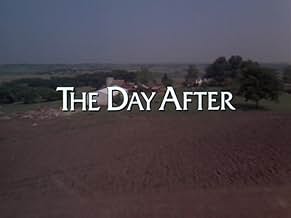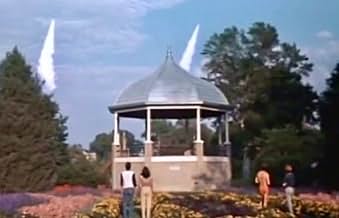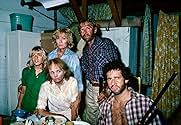Siamo a Lawrence, cittadina a 40 Km da Kansas City. La vita di ogni giorno trascorre tranquilla. Ma si diffondono notizie allarmanti di una escalation bellica. All'improvviso i missili foran... Leggi tuttoSiamo a Lawrence, cittadina a 40 Km da Kansas City. La vita di ogni giorno trascorre tranquilla. Ma si diffondono notizie allarmanti di una escalation bellica. All'improvviso i missili forano il cielo e si abbattono al suolo, è la catastrofe nucleare.Siamo a Lawrence, cittadina a 40 Km da Kansas City. La vita di ogni giorno trascorre tranquilla. Ma si diffondono notizie allarmanti di una escalation bellica. All'improvviso i missili forano il cielo e si abbattono al suolo, è la catastrofe nucleare.
- Vincitore di 2 Primetime Emmy
- 6 vittorie e 11 candidature totali
- Stephen Klein
- (as Steven Guttenberg)
Recensioni in evidenza
It was just six years after this movie came out that the Berlin Wall came down at the start of the collapse of the Soviet Union. By 1983, when this film was made, the Soviets had greatly built up their military armament under Leonid Brezhnev. But even his reign at the head of the USSR (1964-1982) was after the worst scares and threats of nuclear war. The most dangerous time of the Cold War was from its start at the end of WWII – under Josef Stalin, through Nikita Kruschev in October, 1964. Kruschev sent Russian tanks to put down the Hungarian Revolution in November 1956. He was at the helm of the USSR during the Cuban Missile Crisis in October, 1962. And it was during his rule that the Berlin Wall went up, beginning on Aug. 13, 1961.
The placing of this movie in the U.S. heartland was significant. It was here that the U.S. had two major defense systems that it hoped would be the greatest deterrents to nuclear war. The first was the Strategic Air Command (SAC) headquartered at Offutt Air Force Base south of Omaha. As the movie noted, that was about 190 miles north of Kansas City. SAC was established in 1946 and was deactivated in 1992, after the fall of the Soviet Union. SAC had several bases around the U.S. with long-range bombers equipped to deliver nuclear bombs to the USSR.
And, from 1961 until its end, SAC operated an Airborne Command Post out of Offutt. For the next 30 years, an airborne command center would be aloft over the central U.S. at all times. The first aircraft fitted and used for such duty was the EC-135. By the 1970s, the Air Force acquired B-747s for this task. The airborne command rotated so that the active command aircraft would never be caught on the ground or in the air near any U.S. site that might be a target for Soviet missiles.
The second defense system was the installation of some 1,000 Minuteman missiles. These were housed in underground silos across several states – from Montana to Missouri. "The Day After" shows this aspect very well. The Minuteman Missile program began in 1961 and has had three upgrades of replacement missiles. Many of the original sites were abandoned and turned back to landowners after strategic arms reductions. But a decade into the 21st century, the remaining U.S. missile defense force included some 450 third generation Minuteman missiles.
Besides these aspects, this film is also of interest to me for personal experiences. After attending college one year, I worked on a survey crew in the summer of 1961 to lay the cable for missile silos in southeast Nebraska. These were Atlas missile sites to protect one of the SAC bases – at Lincoln. That base, since closed, then had 120 long-range bombers. Then, by early 1962, I was a paratrooper stationed in West Germany. The U.S. and NATO were replenishing their military forces that had been allowed to decline after WWII occupation ended in 1957. The rebuilding was triggered when East Germany began putting up the Berlin Wall in 1961. At the same time, the Soviets were increasing their forces along the Czech border. In this movie, that's where the Russians invaded West Germany through the Fulda Gap. In my first months in Germany, we took part in combined military maneuvers and war games along that border. Our units had border guard duty and we laid land mines. We also had the then-secret Davy Crockett tactical nuclear weapons. The movie script has an account of three nuclear devices exploding over Russian troops that had invaded West Germany.
It may be hard for people born in the last few decades to grasp the time and circumstances of the Cold War. But, besides our experiences growing up under the very real threat of nuclear war in the 1950s and 1960s, many of us have met people who lived under Soviet oppression. Should we not trust their words and take their warnings to heart about such tyrannies?
While serving in Germany, I met another paratrooper who was from Hungary. He had been a student in Budapest during the Hungarian Revolution in the fall of 1956. He had tossed Molotov cocktails at Russian tanks, and later escaped to the West where he joined the U.S. Army. He became a friend and later flew to the U.S. to take his citizenship test, and be sworn in as an American. Calmer, wiser leaders have been the rule among the world's military powers the past few decades. But now we have smaller countries with nuclear capabilities. Pray that reason will continue to outweigh radical ideology so that we never have a nuclear disaster like that in "The Day After."
The critics say the film was not graphic enough (they prefer things like Threads) or too graphic (prefering more subtile films like Testament ). There is no need to be totally graphic and accurate in portraying the events. Yes, we know it would be worse. But the goal is not to gross everyone out. We want younger audiences to see the film too - and that would never happen with something like theads. Likewise, a mored emotional but action lacking film would not draw in the audiences. The purpose was to 'get the point accross' and I think it did that very successfully - bad acting, flubbed lines, stock footage and all. It showed enough of the circumstances surrounding the events for those who had some education in things could recognize issues and say,"Yes thats right" while not being overly graphic so that only adults could see it.
If you want to see an action movie about nuclear war or you want to see a touchy-feely emotional treatment of the losses due to war - this film is not for you. The purpose of this film is to show what nuclear war may be like (in a very superficial way) and to remind everyone that it must NEVER happen again. Back in the early 1980's with the Soviets under a rotating leadership of old hardliners and the US with Ronny talking smack - the threat was very real and the reality check this film delivers was needed. It doesn't play as well in the year 2002 - but you must remember when a film was made when you see it.
But first, a little preface. I was in the second grade (appr. 1982), when I first heard about the nuclear war. We had a number of lectures on it - of course the information was adapted so that 8-9 year old kids could understand it. We were impressed, but childhood has a wonderful gift that lets you quickly forget what was bad. So during the only false alarm that was held in our school the whole lot of students and tutors were brought out into the schoolyard, and we all stood in lines and through snowballs at each other imitating air bombing, and there was a feeling of excitement everywhere. The fact is, that many of us treated the threat as something so-far-away-that-it's-not-worth-worrying-about.
The movie was shown on out TV once only (with all the necessary precautions like "don't let nervous people see it"). Well, to say that I was terrified is to say nothing. For what it did, was that it made the threat so ordinary - and so real. Though for me it happened on the other side of the planet, you could easily imagine that the same thing would happen in my own country - and no fools - it would be absolutely THE SAME.
For some period thereafter I became slightly phobic ("Ma, what's that roar over our house, it's too low for a plane heading to the nearest airport"). But now I regard it as a good experience, because it made me think. I got a clear understanding that this COULD happen. I guess there was quite a big number of people in our country with the same understanding, and together with the threatened people from other countries they prevented the whole thing from happening right then. Hope the plain old common sense will help prevent the nuclear apocalypse in future.
P.S. Recently I saw the movie one more time, and it stirred the same emotions, as it did in my childhood. A great movie, that's all I can say...
Lo sapevi?
- QuizThe program originally aired on November 20, 1983. It remains the most-watched TV movie in U.S. history. Estimates put the viewership at over 100 million Americans, with a Nielsen share of 62 percent.
- BlooperWhen Dr. Austin (Lin McCarthy) is explaining the effects of the electromagnetic pulse (EMP) from the nuclear blast, he says. "It's all theoretical. It's never happened before." In actuality, the United States detonated a 3.8 megaton warhead at an altitude of 50 miles, 1 August 1958, in the Operation Hardtack Teak shot nuclear test. This event caused unexpected communications disruption and damage to electrical equipment in an area that ranged between Hawaii and New Zealand. It was the first observation of the EMP effect.
- Citazioni
[intercontinental ballistic missiles are being fired]
Cynthia: What's going on?
Joe Huxley: Those are Minuteman missiles!
Cynthia: Like a test, sort of... like a warning?
Joe Huxley: [shakes his head, staring at the missiles in awe and disbelief] They're on their way to Russia. They take about 30 minutes to reach their target.
Aldo: So do theirs, right?
- Curiosità sui crediti[After movie has ended, before end credits.] The catastrophic events you have just witnessed are, in all likelihood, less severe than the destruction that would actually occur in the event of a full nuclear strike against the United States. It is hoped that the images of this film will inspire the nations of this earth, their peoples, and leaders to find the means to avert that fateful day.
- Versioni alternativeThe rare laserdisc version (released by Image Entertainment in 1995) is advertised as being a director's cut. This version runs 127mins, is widescreen in its proper ratio of 1:75:1 and has a commentary track by director Nicholas Meyer. At the time of this release full versions of the film were not readily available. So it stands to chance this director's cut is actually the same as the current mgm dvd (US region 1) as far as content and running time goes, with the exception of the widescreen format and commentary track which so far has only be found on this laserdisc.
- ConnessioniEdited from Panico nello stadio (1976)
































